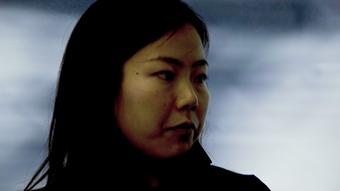SAMBI SAITO:“I’M VERY ANGRY WITH TEPCO!“
The Japanese have a reputation for being polite and reserved, and in general, Sambi Saito lives up to it. But something changed on 11 March, 2011. Memories of the day of the tsunami and the resulting Fukushima Dai-ichi nuclear disaster still haunt her.

“It was quite a shock. I stayed on the internet day and night all during that time, trying to find out exactly what had happened.” Sambi Saito remembers the 11th of March, 2011, the day of the earthquake and tsunami, very clearly - and following nuclear disaster at the Fukushima Dai-ichi power plant. She tried to get information on developments in Japan from Cologne, but just getting through proved difficult. The mobile phone networks in Japan had broken down, and it took her several hours to confirm that her family were safe and sound. During the first days of the disaster, Sambi felt mainly anxiety and a profound closeness to her homeland. Only gradually did rage enter into it – rage over the way the Japanese authorities handled the Fukushima nuclear disaster. “I was furious at the Japanese government, because they lied to us. And I’m very angry with Tepco. This is a chance to be active and change the country.” Sambi admits that her critical stance has something to do with the ten years she’s lived in Germany. “The Japanese are a very polite and reserved people. We always try to have consideration for the way others think. But when we’re confronted with a huge lie – and the politicians and TEPCO are blatantly lying – we have to do something about it. You just get furious when you’ve obviously been lied to, and you have to take action against it and demonstrate – a bit like the Germans do!”
The Call of the Bread
When Sambi first came to Germany, specifically to Cologne, in 2003, this country in the heart of Europe was still relatively unknown to her. What she already knew and loved was German bread. Her music-teacher father used to bring it back to Tokyo with him from his many trips to Europe. Before she’d even left school, she’d resolved to travel to this land of many tasty kinds of bread one day and learn how to bake them. When Sambi turned 21, she hopped a plane to Germany. She trained as a baker in Cologne and got her master craftsman’s qualification. Then she went on to take a degree in nutrition and food science at the Niederrhein University of Applied Science in Mönchengladbach. Now she’s developing baking mixes and bread improvers in the research department of the Georg Plange GmbH & Co. industrial mill in Neuss. Sambi gets along well with her German co-workers, now that she’s overcome a few initial difficulties adapting related to her 1.53-meter size – a bit short for German norms. She has to take a small stepladder wherever she goes. Other than that, she had hardly any problem at all settling into the work routine. “Like us Japanese, the Germans are generally punctual. Of all the Europeans, I think the Germans are most like us – also because they address each other formally. Germany’s a second home to me.” Something else she likes is that men and women are treated almost equally in Germany. That’s very different from Japan. She also likes the fact that an employee can talk to the managing director or the department head – and even make jokes. “In Japan, you hardly ever really have any contact, at all, with your managing director!”
New Goals
Sambi intends to return to Japan some day – she misses her family too much. But she’d rather not live in Tokyo. Now that she’s gotten used to “small town” life in Cologne, the Japanese megalopolis seems too big and loud to her. She would most like to live in the south of Japan, or even Okinawa, the archipelago in the Pacific. “Okinawa is to us Japanese what Mallorca is to Germans. It’s always warm, and the atmosphere is more easy-going than in the rest of Japan.” Maybe she’ll go into business for herself there some day. “A bakery, a café, we’ll see. I’ve had good training, you know!”